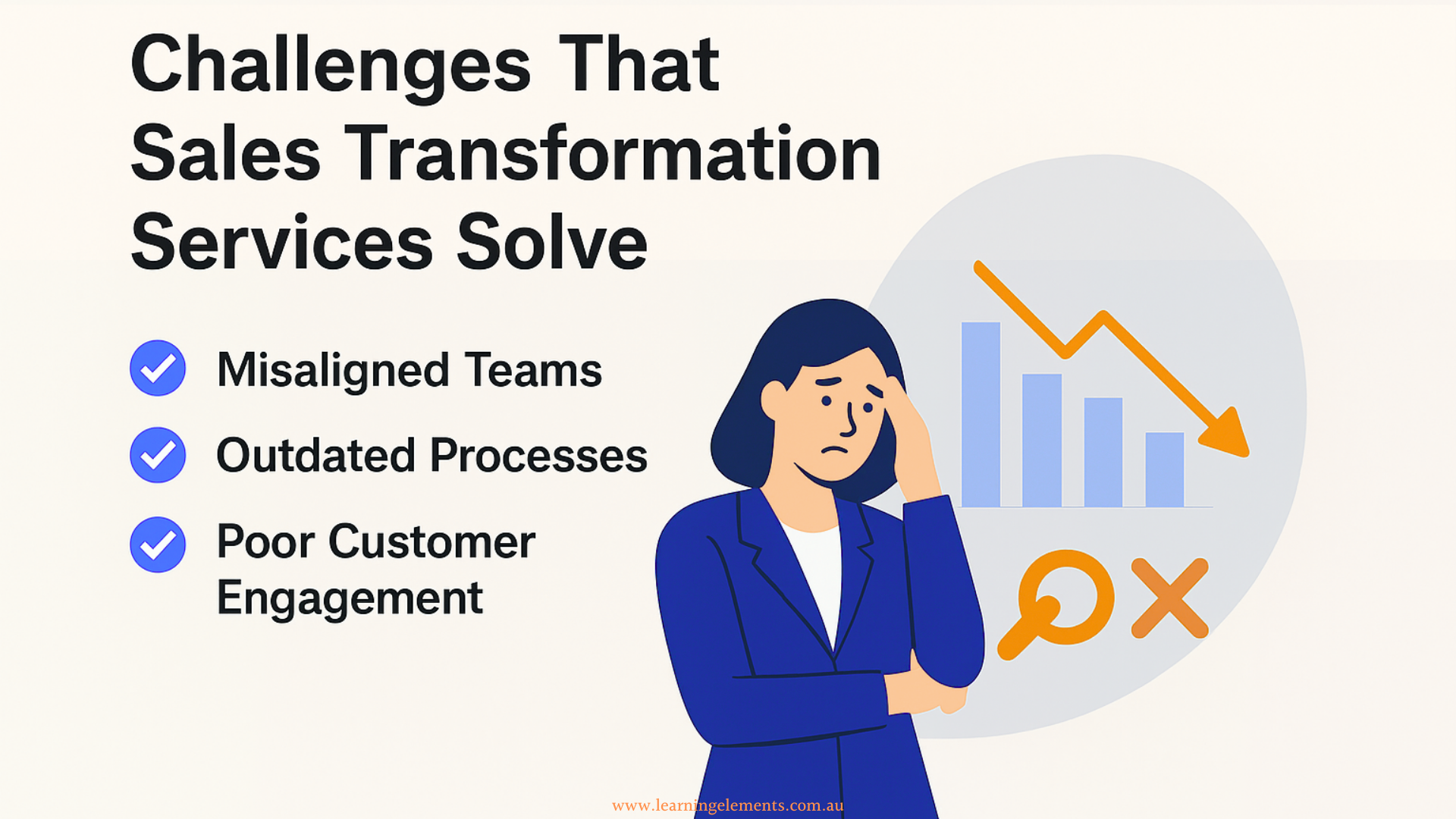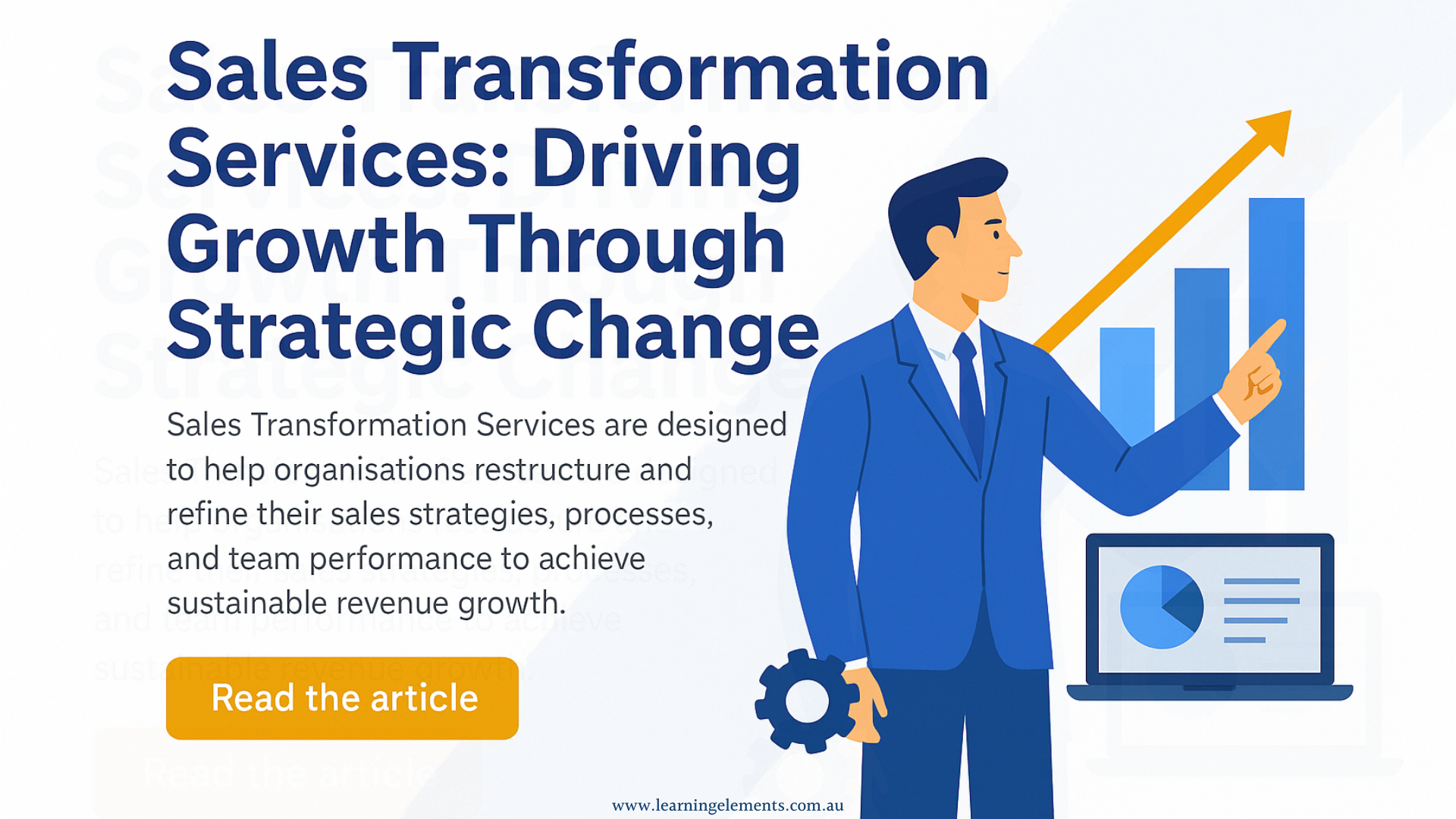Sales Transformation Services: Driving Growth Through Strategic Change
Many sales teams work harder than ever but still struggle to hit their targets. Deals stall, customer expectations rise, and outdated processes hold back growth. This is why more organisations are turning to sales transformation services—a structured way to align strategy, people, and technology to unlock sustainable success.
Rather than focusing only on short-term fixes, sales transformation services address the deeper issues that limit performance. They reshape how sales teams operate, create consistency in customer engagement, and introduce tools that make selling smarter, not harder. For businesses aiming to move beyond incremental improvements, these services provide a roadmap for both immediate impact and long-term strategic change.
What Are Sales Transformation Services?
Sales transformation services are designed to help organisations restructure and refine their sales strategies, processes, and team performance to achieve sustainable revenue growth. These services address challenges in sales operations, improve customer engagement, and align sales efforts with overall business objectives.
Components of Sales Transformation
1. Sales Strategy Development
A strong sales strategy ensures that sales goals align directly with broader business objectives. This involves using data-driven forecasting and detailed market analysis to anticipate trends and allocate resources effectively. When businesses set a clear strategy, they gain predictable revenue outcomes and a competitive advantage.
2. Sales Process Optimisation
Inefficient workflows often slow down sales cycles. By streamlining processes and automating repetitive tasks, organisations can reduce friction and improve productivity. This means deals close faster, teams collaborate better, and costs are reduced without compromising customer experience.
3. Sales Team Training and Coaching
Even the best strategy fails without a capable team. Structured training—whether instructor-led, online, or self-paced—helps sales professionals refine their skills. Leadership coaching ensures managers can motivate, track, and elevate performance across the team, creating consistency and long-term capability.
4. Technology Integration for Sales Enhancement
Modern selling relies on technology. CRM systems, artificial intelligence, and automation tools allow businesses to personalise customer engagement, improve accuracy, and scale operations efficiently. Integrating tools such as CPQ (Configure, Price, Quote) or revenue intelligence platforms gives sales teams the insights they need to act quickly and effectively.
5. Performance Measurement and Continuous Improvement
Success requires continuous evaluation. By tracking KPIs, using dashboards, and running regular performance reviews, businesses can adapt strategies in real time. A “test and learn” mindset ensures the sales organisation doesn’t stagnate but continues to evolve as markets change.
6. Sales Operations and Revenue Operations (RevOps)
RevOps brings together forecasting, analytics, compensation design, and cross-functional coordination. This ensures all business units work in harmony, creating a reliable, data-driven framework that supports scalable growth.
7. Sales Enablement and Marketing Alignment
When sales and marketing share the same insights, messaging, and tools, lead quality improves and conversions increase. Providing sales teams with ready-to-use content and buyer intelligence strengthens customer conversations and reduces wasted effort.
8. Customer-Centric Design and Analytics
Sales transformation is not just internal—it must reflect the customer’s journey. Leveraging customer feedback, behavioural insights, and experience analytics helps refine sales processes to build stronger relationships, drive loyalty, and remain relevant in competitive markets.
9. Agile and Test-and-Learn Deployment
Sales transformation is never a one-off project. By adopting agile methods and piloting changes with small “test-and-learn” rollouts, organisations reduce risks, improve adoption, and continuously optimise the transformation process.
Explore Training & LMS Solutions
Elevate your team with tailored sales training, eLearning, and business consulting solutions.
Summary of Sales Transformation Components
| Component | What It Covers | Typical Benefits / Business Impact |
|---|---|---|
| Sales Strategy Development | Aligns goals with business objectives, forecasting, and market analysis. | Clarity, direction, and predictable revenue growth. |
| Sales Process Optimisation | Streamlines workflows, automates tasks, and reduces inefficiencies. | Shorter deal cycles, improved efficiency, and reduced costs. |
| Sales Team Training & Coaching | Instructor-led, online, and self-paced training plus leadership coaching. | Stronger skills, better motivation, and consistent performance. |
| Technology Integration | CRM, AI, CPQ, automation, and revenue intelligence tools. | Scalability, accuracy, and personalised customer experiences. |
| Sales Operations & RevOps | Forecasting, compensation, analytics, and cross-functional alignment. | Reliable execution, team alignment, and data-driven growth. |
| Performance Measurement & Improvement | KPIs, dashboards, reviews, and test-and-learn approaches. | Continuous improvement, accountability, and adaptability. |
| Sales Enablement & Marketing Alignment | Content, insights, and aligned messaging across marketing and sales. | Better lead quality, higher conversions, and team cohesion. |
| Customer-Centric Design & Analytics | Customer feedback, behaviour data, and experience insights. | Higher loyalty, retention, and market relevance. |
| Agile / Test-and-Learn Deployment | Pilots, MVPs, and iterative rollouts to refine transformation before scaling. | Lower risk, faster adoption, and sustained long-term success. |

Challenges That Sales Transformation Services Solve
Businesses often face sales roadblocks that prevent them from reaching full growth potential. Sales Transformation Services address these challenges head-on, ensuring your sales function is agile and competitive.
Common Pain Points Solved
- Misaligned Teams – When sales, marketing, and customer service work in silos, messages become inconsistent, slowing down the sales cycle. Transformation aligns all departments under one clear strategy.
- Outdated Processes – Manual reporting, unclear lead qualification, and rigid workflows lead to inefficiency. Optimisation introduces automation and streamlined processes.
- Poor Customer Engagement – Customers expect personalised, meaningful interactions. Without modern tools, teams struggle to build long-term trust.
- Inconsistent Performance – A lack of structured training and performance management leaves sales results unpredictable.
Pitfalls Without Transformation
If businesses avoid sales transformation, they risk:
- Declining customer satisfaction as competitors adopt smarter tools.
- Longer sales cycles due to inefficient processes.
- High employee turnover from lack of coaching and motivation.
- Revenue stagnation despite market opportunities.
Example Scenarios
- A mid-sized tech company relying on manual spreadsheets for forecasting misses growth opportunities due to inaccurate data.
- A retail business with no formal sales training sees inconsistent results, where top sellers carry the entire team while others struggle.
- A scaling enterprise fails to adopt automation, leaving their sales team overwhelmed with admin instead of focusing on closing deals.
Benefits of Sales Transformation Services
- Increased Revenue – Structured strategies to consistently boost sales performance.
- Enhanced Sales Efficiency – Streamlined processes to close deals faster.
- Improved Customer Relationships – Personalised, meaningful customer engagement.
- Stronger Sales Team Performance – Teams equipped with advanced sales techniques and coaching.
- Scalable Growth – Transformation builds systems and processes that can grow with your business, making it easier to expand into new markets or handle increased demand.
- Data-Driven Decision-Making – With modern tools and performance measurement, businesses can rely on accurate data for forecasting, budgeting, and resource allocation.
- Employee Retention and Engagement – Well-trained and motivated teams are more likely to stay, reducing turnover costs and strengthening company culture.
- Compliance and Risk Reduction – Modernised processes and systems help businesses meet regulatory standards, minimise errors, and reduce operational risks.
- Competitive Advantage – By staying ahead with advanced sales strategies, customer engagement practices, and technology integration, organisations can outpace competitors in crowded markets.
Schedule a Strategy Call
Explore how Sales Transformation Services can work for your business.
How Sales Transformation Services Drive Growth Through Strategic Change
Sales transformation isn’t just about fixing sales inefficiencies—it’s about enabling strategic shifts that reshape how businesses compete and grow. By rethinking sales from the ground up, businesses can align their people, processes, and technology with long-term growth ambitions.
- Aligning Sales with Business Strategy: When sales goals are directly linked to wider organisational objectives, every customer conversation contributes to growth. Clear alignment ensures sales teams focus on profitable opportunities, rather than chasing every lead, and builds a culture where revenue is generated with purpose.
- Building Scalable and Efficient Processes: Inefficient processes drain resources and limit growth. By redesigning workflows and introducing automation, Sales Transformation creates a sales engine that can scale without adding unnecessary cost. This reduces cycle times, increases deal velocity, and helps businesses respond quickly to market shifts.
- Empowering Sales Teams: Skilled, confident sales teams are better equipped to win business and adapt to changing markets. Through tailored training, leadership coaching, and ongoing development, they build the capability to perform consistently at a high level. A stronger, more motivated team not only enhances results but also fosters a cultural shift that endures.
- Leveraging Technology for Competitive Advantage: Modern sales technology—from CRM systems to AI-powered forecasting—enables teams to engage customers in more personalised and meaningful ways. By embedding these tools, businesses can anticipate customer needs, build trust faster, and make smarter decisions based on real-time insights.
- Driving Continuous Improvement: With clearly defined, data-driven KPIs, sales evolves into a learning organisation that thrives on adaptation. By embedding KPIs, advanced analytics, and structured performance reviews, businesses foster a culture of continuous improvement. This approach ensures sales strategies remain relevant, agile, and resilient, enabling teams to respond effectively to emerging challenges and future opportunities.
Related Read: How to Use AI in Sales
Who Needs Sales Transformation Services?
Not every business is at the same stage of growth, but most can benefit from some level of sales transformation. The key is recognising when it’s time to act.
Businesses That Benefit the Most
- Small to Medium-Sized Businesses (SMBs) – Often agile but lacking structure. Transformation gives them processes and training to scale sustainably.
- Scaling Enterprises – Businesses experiencing rapid growth may struggle to keep sales aligned with increasing demand. Transformation ensures efficiency and consistency.
- Corporate Organisations – Larger enterprises need to adapt to evolving markets, customer expectations, and global competition. Transformation helps modernise outdated strategies.
Signs You’re Ready for Sales Transformation
- Sales growth has plateaued despite market demand.
- Your team spends more time on admin than selling.
- Customer churn is rising due to poor engagement.
- There’s little or no alignment between sales and marketing.
- Training happens ad hoc, with no structured performance measurement.
How Learning Elements Supports Sales Transformation
At Learning Elements, we provide tailored sales transformation services designed around your unique business needs. With expertise in facilitation, coaching, instructional design, and learning technology, we ensure your sales teams are fully equipped to excel in today’s competitive environment.
- Industry-Specific Training – We design training that reflects the unique needs of different sectors, ensuring practical, relevant application for Australian businesses.
- Local and Global Best Practices – Our approach blends proven international methods with insights tailored to the Australian market, helping teams remain competitive both locally and abroad.
- Blended Learning Delivery – Through a mix of instructor-led training, eLearning, and digital coaching, we provide flexible solutions that suit modern workplaces.
- Ongoing Support and Continuous Improvement – Transformation doesn’t end with training. We offer long-term coaching, performance reviews, and LMS tools to ensure strategies evolve with your business.
- Customisable Solutions – Whether you’re an SME scaling up or a corporate enterprise restructuring, we tailor services to your goals, workforce size, and industry challenges.
Book a Free 30-Minute Consultation
Speak with our consultants and discover opportunities to transform your sales.
How Long Does a Sales Transformation Take?
The timeline for a sales transformation depends on the scope, but businesses can expect to see measurable changes at different stages.
Typical Timeframes
- Short-Term (3–6 Months): Initial improvements such as process optimisation, tool implementation (CRM/automation), and skill-based training.
- Medium-Term (6–12 Months): Team adoption of new strategies, stronger customer engagement, and noticeable improvements in efficiency.
- Long-Term (12+ Months): Full cultural change, sustained revenue growth, and alignment across all sales-related functions.
Factors That Influence Timeline
- Size of the sales team and organisation.
- Current maturity of sales processes.
- Willingness of leadership and staff to embrace change.
- Complexity of technology integration.
Future Outlook
The future of sales transformation lies in AI-driven analytics, hyper-personalised customer journeys, and continuous skill development through digital learning. Businesses that embrace transformation now will not only close more deals but also build future-proof sales functions capable of adapting to new technologies and market shifts.
Related Read: Business Transformation Consulting: Driving Organisational Growth and Efficiency
FAQs
- What is the difference between sales training and sales transformation? Sales training improves individual skills, while sales transformation realigns strategy, process, technology, and culture for long-term impact.
- How do I know if my business needs sales transformation services? If your sales have plateaued, processes feel inefficient, or your team struggles with consistency, you’re a strong candidate.
- What industries benefit most from sales transformation services? Almost all—tech, finance, healthcare, education, retail—any business with a sales function can benefit.
- Is sales transformation expensive? Costs vary based on scope (team size, training, tech integration). However, most businesses see a strong ROI within 12–18 months.
- Can sales transformation work for small businesses? Yes. SMEs often see the fastest results because they can adopt new processes and tools quickly.
- What role does technology play in sales transformation? Tools like CRM, AI analytics, and automation personalise interactions, reduce manual tasks, and improve forecasting.
- How do you measure success in a sales transformation program? Through KPIs such as revenue growth, conversion rates, deal velocity, and customer satisfaction scores.
- What support does Learning Elements provide after initial training? Ongoing coaching, LMS solutions, refresher training, and performance reviews to ensure continuous improvement.
Conclusion
Sales transformation is not only about increasing sales figures; it is about creating a smarter and more adaptable sales function that can support growth well into the future. By combining strategy, process optimisation, team development and the right technology, organisations can build sales teams that drive lasting success.
The businesses that commit to transformation today will not simply react to changes in the market. They will set the pace and influence the direction of their industries. With the right approach, sales become more than closing transactions. It becomes a strategic advantage that delivers measurable growth and long-term value.
At Learning Elements, we’re passionate about helping businesses transform sales into a strategic advantage.
Contact Us for Custom Solutions
Do you need training design or business and sales consulting support? Let’s discuss your needs.


